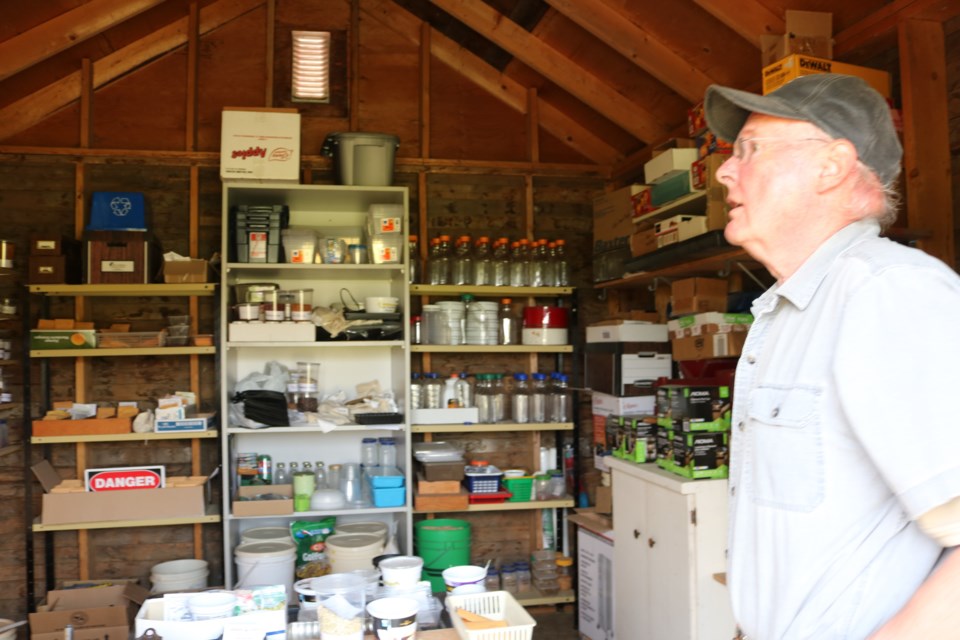YORKTON - When does an interest evolve into a hobby, then a passion and finally an addiction?
Warren Crossman might not be able to pinpoint the exact moments in the process, but a passing interest in beans has certainly reached the point some might suggest addiction.
“I generally have a rotation of 30-40 varieties of beans,” he explained standing in his garden on the farm northwest of Yorkton.
This year, thanks to a late wet spring which delayed planting this year there are far fewer in the garden.
Of course there’s no worry because in Crossman’s ‘seed shed’ the walls are lined with containers of seeds of not just the 30-40 varieties grown most years, but some 140 varieties of beans.
Crossman said another local gardener told him his interest in beans was verging on becoming an addiction, suggesting 100 varieties might be the tipping point. He said at the time he was still well below the mark, but he kept acquiring more and one day realized he had 98.
Not wanting to be accused of having an addiction for having 100, he went out and added six more so he never actually had the magical 100.
Joking aside, Crossman is dedicated to growing beans.
“I keep records of everything about them,” he said.
So Crossman knows where they originated, and if the variety name is accurate he digs into its history.
Often though Crossman acquires beans which have been grown by someone for years and the actual variety long forgotten. Those go into the collection with a generic name based on who he acquired them from, or where. For example a ‘Prairie River’ bean came from some who lived at the Saskatchewan community, the beans with a lineage likely back to Ukraine.
Over the years Crossman simply added new ones whenever it has been possible.
“I’ve got some through different seed companies who have offered them,” he said.
Other times people have sent him beans, or he’s made a swap of seeds.
“Some are rare. Some are heirloom,” he said, adding while he isn’t sure there’s an exact definition of what makes a variety heirloom, he suggests any that were created and being grown at least 35 years ago.
“I don’t think it’s fixed (the age),” he said, adding in his collection “some of these go back to the 1800s.”
While 140 bean varieties might sound like a lot – and it is – there are certainly dozens more grown often by individual families who have kept seed for decades, often tracing back to the countries their families immigrated from.
As hobbies turned at least quasi addictions often do, Crossman’s has spread.
He moves to another area of the garden and points out more than 50 varieties of potatoes.
Unlike beans, which once dry can be stored and are viable to grow at least a few years into the future, each of the varied potatoes must be grown annually, and carefully stored to provide seed for the following year.
“Potatoes are a lot of work,” he said, adding everything must be meticulous in storage keeping the identities preserved year-to-year.
Interestingly “there’s way more potato varieties in the world than beans. There’s literally hundreds of varieties,” said Crossman.
And sometimes it’s hard to know if varieties are different, or simply known by slightly different names. Matsuma and Matsuyama potatoes grow side by side in the plots with varieties grown in alphabetical order. Crossman said they might be the same thing with the source he got them from offering the different spellings, but since he is unsure he keeps them separate.
Then a bit farther into the expansive garden that includes several varieties of rhubarb, many different lilies, and tonnes of other plants there is an area dedicated to grasses such as blue wheat grass. This is a more limited collection, but Crossman still pegs it at about 30-plus varieties.
So how did the interest start?
“I don’t know,” offered Crossman. “When I was young growing up as a kid in Saskatoon my mom and dad grew a garden. I’ve always had a garden.”
But in terms of beans and spuds “it wasn’t something I said I was going to do. It’s something that just sort of happened.”

